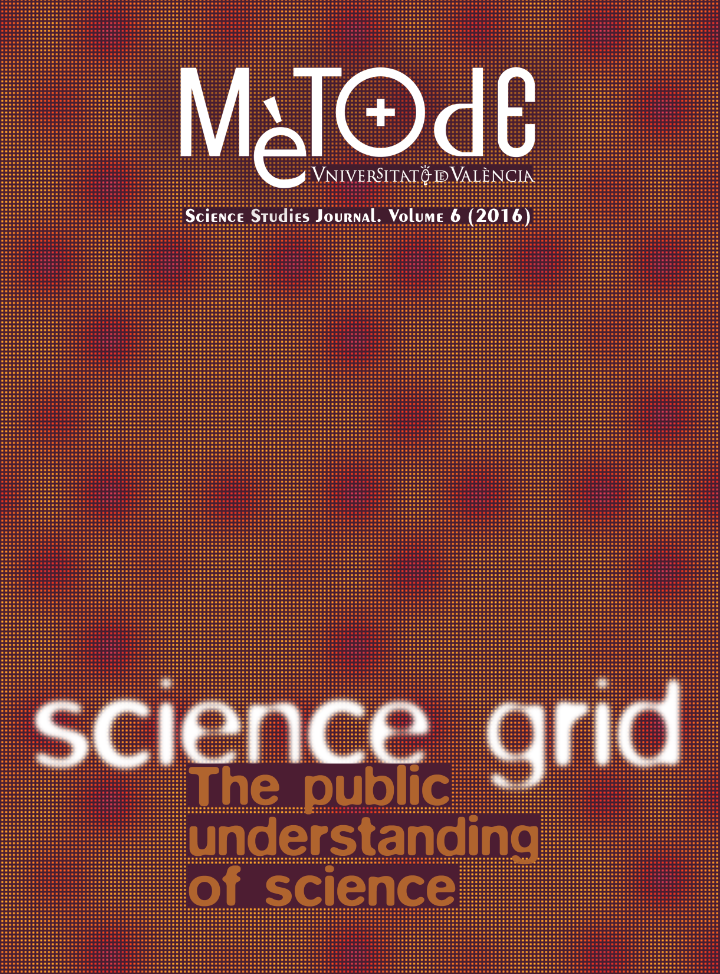The RNA World: Piecing together the historical development of a hypothesis
DOI:
https://doi.org/10.7203/metode.6.5146Keywords:
Origin of life, RNA World, ribonucleotidyl coenzymes, catalytic RNA Abstract
Abstract
The concept of an RNA world is a hypothesis firmly rooted in empirical data and is part of a long and complex scientific perspective that goes back more than fifty years to the discovery of the central role RNA and ribonucleotides play in protein synthesis and biochemical reactions took place. As the understanding of RNA biology progressed, several independent proposals of protein-free primordial life forms were suggested. Although this possibility was strongly reinforced with the discovery of ribozymes, there are many definitions of the RNA world, including several contradictory ones. One could say that it was an early, perhaps primordial, stage during which RNA molecules played a much more conspicuous role in heredity and metabolism and, particularly, in the origin and early evolution of protein biosynthesis. The overwhelming evidence for the catalytic, regulatory, and structural properties of RNA molecules, combined with their ubiquity in cellular processes, can only be explained with the proposal that they played a key role in early evolution and perhaps in the origin of life itself.
 Downloads
Downloads
 References
References
Bada, J. L., & Lazcano, A. (2003). Prebiotic soup: Revisiting the Miller experiment. Science, 300, 745–746. doi: 10.1126/science.1085145
Belozerskii A. N. (1959). On species specificity of nucleic acids in bacteria. In A. I. Oparin, A. G. Pasynskii, A. E. Braunshetin, & T. E. Pavloskaya (Eds.), The origin of life on Earth (pp. 322–331). New York: Pergamon Press/MacMillan Company.
Brachet, J. (1959). Les acides nucléiques et l’origine des proteins. In A. I. Oparin, A. G. Pasynskii, A. E. Braunshetin, & T. E. Pavloskaya (Eds.), The origin of life on Earth (pp. 361–367). New York: Pergamon Press/MacMillan Company.
Crick F. H. C. (1968). The origin of the genetic code. Journal of Molecular Biology, 39, 367–379.
Eakin, R. E. (1963). An approach to the evolution of metabolism. Proceedings of the National Academy of Sciences, 49, 360–366. Gilbert, W. (1986). The RNA World. Nature, 319, 618. doi: 10.1038/319618a0
Handler, P. (1963). Evolution of the coenzymes. In A. I. Oparin (Ed.), Proceedings of the Fifth International Congress of Biochemistry, Vol. III. Biochemistry (pp. 149–157). New York: Pergamon Press/Macmillan Company.
Lazcano, A. (2012). The biochemical roots of the RNA world: From zymonucleic acid to ribozymes. History and Philosophy of the Life Sciences, 34, 407–424.
Maurel, M. C., & Ninio, J. (1987). Catalysis by a prebiotic nucleotide analog of histidine. Biochimie, 69, 551–553.
Oparin, A. I. (1938). The origin of life. New York: MacMillan.
Oparin, A. I., Pasynskii, A. G., Braunshetin, A. E., & Pavloskaya, T. E. (Eds.). (1959). The origin of life on Earth. New York: Pergamon Press/MacMillan Company.
Orgel, L. E. (1968). Evolution of the genetic apparatus. Journal of Molecular Biology, 38, 381–393.
Orgel, L. E., & Sulston, J.E. (1971). Polynucleotide replication and the origin of life. In A. P. Kimball, & J. Oró (Eds.), Prebiotic and biochemical evolution (pp. 89–94). Amsterdam: North-Holland.
Rich, A. (1962). On the problems of evolution and biochemical information transfer. In M. Kasha, & B. Pullman (Eds.), Horizons in biochemistry (pp. 103–126). New York: Academic Press.
White III, H. B. (1976). Coenzymes as fossils of an earlier metabolic state. Journal of Molecular Evolution, 7, 101–104.
Woese, C. R. (1967). The Genetic Code: The molecular basis for gene expression. New York: Harper and Row.
Downloads
Published
How to Cite
-
Abstract1971
-
PDF697
Issue
Section
License
![]()
All the documents in the OJS platform are open access and property of their respective authors.
Authors publishing in the journal agree to the following terms:
- Authors keep the rights and guarantee Metode Science Studies Journal the right to be the first publication of the document, licensed under a Creative Commons Attribution-NonCommercial-NoDerivatives 4.0 International License that allows others to share the work with an acknowledgement of authorship and publication in the journal.
- Authors are allowed and encouraged to spread their work through electronic means using personal or institutional websites (institutional open archives, personal websites or professional and academic networks profiles) once the text has been published.





